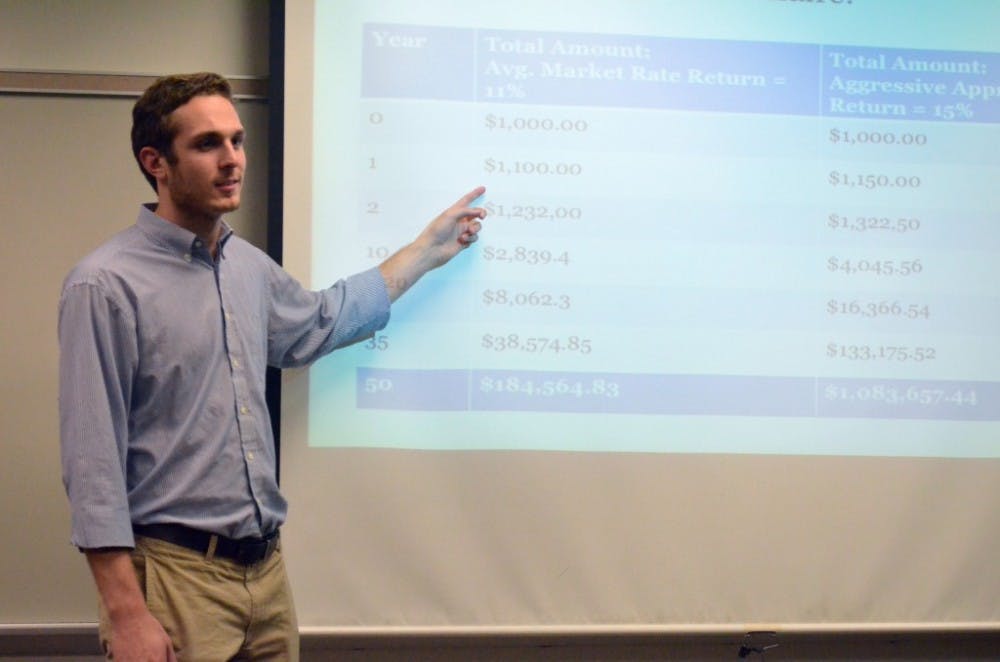Be it a football stadium, a field or a canvas, everyone has a place where they can share their passion and expertise with others. For Elon University senior Matthew Zimpelman, that place is the front of a classroom, sharing his knowledge of financial literacy training.
Zimpelman is a member of the local chapter of Beta Alpha Psi, an international honor organization for financial information students and professionals. Serving as the financial program coordinator, Zimpelman has designed a presentation that captures the fundamentals of financial literacy in a unique and engaging manner to be presented to Alamance County high school students. Since then, 28 members of BAP have joined the effort to share the significance of financial literacy with their surrounding community.
The 45-minute session has reached 420 high school students in Alamance County since October. From relating credit scores to report cards, to using “Who Wants to Be a Millionaire” as a way to analyze the value of investments, Zimpelman said the members try to make financial literacy as comprehensible and fun as possible.
“This isn’t like a lecture. It’s coming from a much younger voice,” he said. “That’s the most important thing. They can associate with us at a much greater level.”
The program emphasizes the value of a college degree by providing students with a breakdown of average starting salaries of those with a high school degree, community college degree and four-year college degree. Students then contextualize these numbers by exploring their own current household budget and spending patterns–an activity Zimpelman said demonstrates how furthering their education will truly impact their financial future.
“The gap between the average starting salaries between a high school graduate and college graduate is said to start at $17,000,” he said. “Comparing their current spending with average starting salaries really makes these numbers meaningful.”
According to Zimpelman, the most significant aspect of the program is it provides information on the consequences of financial decisions to students who may not have had the opportunity to receive that knowledge.
“You don’t realize the demographics of the surrounding area until you step out there and see it,” he said. “That’s why it’s important for us to reach the students who may not have access to financial literacy-related classes.”
Zimpelman recalled a particular instance during his summer internship when he had to hold presentations in local high schools around his hometown. He used going on a field trip as an example, to which a student responded, “We don’t go on school trips.”
“Some of these high schools are very different from the ones we went to,” he said. “And it’s important for us to move beyond Elon to see the demographic changes and emphasize the value [of being financially literate].”
Because of the success of the program, Zimpelman and two other BAP members are planning to bring the program to Elon by offering a Burst the Bubble course this winter, making presentations in various classes and hosting a session in the business school.
“We’re going to take what we used in high school and accelerate it,” he said. “The point is that we’re sharing our knowledge with people who wouldn’t necessarily receive it as non-finance or accounting majors.”
Richard Segel, president of Elon’s chapter of Beta Alpha Psi, said the program has not only impacted the greater community, but also has strengthened the bond between members.
“They have not only put in effort to go make a presentation, but they’ve also spent time preparing for the presentations and giving us feedback on how the students respond to our presentations,” he said
Segel stressed the program’s success is reflective of the local teachers who have allowed the members to take class time.
“We really appreciate all the local teachers in the area who have allowed us to take some valuable class time to present on financial literacy,” he said. “All the teachers have definitely been instrumental in the success of our financial literacy program.
Zimpelman said by sharing their decisions to become accounting and finance majors with various people through these presentations, members also help to break the common stereotype of accounting and finance majors, who are often painted as boring people who are expected to eventually end up in desk jobs.
Patty Cox, assistant professor of accounting and faculty director of BAP, said there is no ounce of truth to the stereotype.
“Through various service projects this semester, our students have shown that accountants are where the action is,” she said. “[They] have volunteered with Habitat for Humanity, gone to area high schools to give financial literacy training, and tutored students in introductory level accounting classes.”
Cox added she couldn’t be more proud of her students for finding a way to use their expertise to give back to the community which, she stressed, is an area that BAP places great emphasis.
“Our students have shown that it is possible to find time in a busy schedule to be involved in a project that one feels passionately about,” she said.


